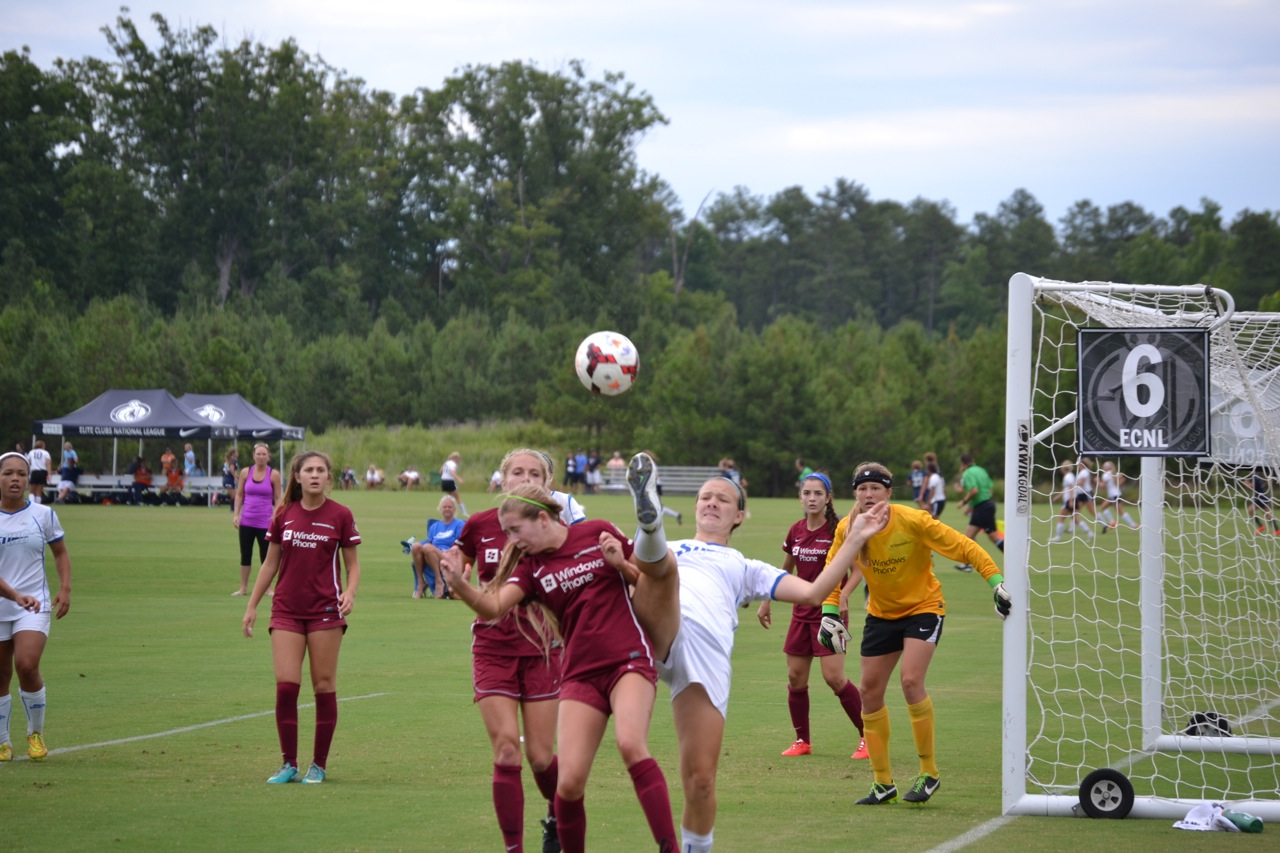Effort Injuries are Taking Kids Out: is “positive” parenting to blame?

 The 16 year old slams down next to me on the bleachers. She’s sporting a knee sleeve on her right leg, the one that still bears the scars from the ACL repair she had 9 months ago. Now that knee is poking through the sleeve, and it is purple and obviously swollen. “I got clobbered,” she tells me, “by my own goalie.”
The 16 year old slams down next to me on the bleachers. She’s sporting a knee sleeve on her right leg, the one that still bears the scars from the ACL repair she had 9 months ago. Now that knee is poking through the sleeve, and it is purple and obviously swollen. “I got clobbered,” she tells me, “by my own goalie.”
Her dad fills in the details: she was blind-sided by a goal keeper who was guesting for her team. She never saw it coming and didn’t have a chance to brace for impact. The MRI report has confirmed their worst fears: she’s re-torn the ACL. She knows what that means: surgery, repair, grueling rehab and recovery. She’ll sit the bench again while all her friends continue to play and get their looks from college coaches.
This young woman has become the victim of something I am seeing more and more: effort injuries. These injuries are not necessarily the result of malice or aggression, but rather, they are perpetrated by a kid who, by all accounts, is just playing her hardest but doing so recklessly. I see it particularly in kids who are weaker in skills, or perceive themselves as weaker, but have landed on a very talented team. The survival mantra in their heads goes, “No one can find fault with me, even if we lose, if it’s obvious that I played the “hardest” of anyone out there.” So they play harder, stomping on the accelerator with abandon, often sacrificing themselves and innocent teammates or unfortunate opponents in the process.
How did we get here?
Many may indict the “win at all costs” environment, with overzealous coaches teaching unsavory practices. While that is certainly out there, I think there is something more at work. I’ll call it the “good job-good effort” syndrome, after this boy. The perpetrators are us: the positive parents.
Let’s look back to the root of this problem. To our credit, about ten years ago we saw ourselves getting “too involved” in our kids’ games so we stepped back – in many cases – to let professional or paid coaches to step in. We were told to let the kids play, let the coach, coach, and keep it light in the car on the ride home. The Positive Coaching Alliance advised us to embrace mistakes as the path to healthy mastery of skill and told us we should reward effort rather than outcome. Effort was something kids could control while outcome (scoreboard success) they could not. The Good job-Good effort kid was born. We, in our best positive-parenting posture, glorified effort. The more effort, the better.
+READ: Injury prevention made easy: Have your players self-monitor their training readiness
Now those effort kids are coming of age in select, competitive soccer and we have an effort injury bonanza. Have our “positive” parenting methods backfired?
I hate to think I have been part of the problem, but let’s take a look at this. When my kid started playing soccer at 4 or 5 years of age, why did she play? Researchers have surveyed these kids and here are some of the top reasons they give: to have fun, to do something I am good at, to improve my skills, to get exercise and stay in shape, to be part of a team, for the excitement of competition.
Now, to me those answers don’t sound very much like kids; they sound very much like the parents of those kids. In my experience, if you ask an elementary aged kid a general or hypothetical question, they will try to give you the “right” answer which, to them is most likely what they’ve heard from their parents. They’re kids. They imitate. Life goes well if you agree with your parents and give them the answer they’re looking for. If you don’t believe me, assess the correlation between their political party affiliation and that of their parents.
+READ: O’Sullivan -The missing ingredient in North American soccer talent development
So, I propose that we take a listen, not only to what kids are telling us, but to what they are not telling but showing us. The one desire in all healthy young kids, athletes or not, is the desire to please their parents. “Mommy, look at me!” they shout and then wait for us to watch them jump in the pool. “Daddy, watch what I can do?” they plead, as they twirl on their tiptoes or throw their best fastball. Then they turn and look for our reaction, waiting for us to applaud and tell them how good that was, which they translate into how good they are. And all is right with the world. Intrinsic motivation is just not part of our young children; they want to please Mom and Dad. This will not appear on any kids’ list of why they play because it is just part of who they are, perhaps the deepest part of who they are.
But when it comes to competitive sports, their performance isn’t always perfect, in fact, sometimes it is not good at all. What used to be automatic applause is now conditioned by game success. What pleases parents? Just give a listen on any sidelines. The roars come for … Scoring! Shooting! Crunching tackles! Aggressive saves! I regularly even hear parents applauding after their player gets cautioned by the referee. “Way to be tough!” “Don’t let them push you around.”
When we encourage aggressive play, our kids hear us, and even as tweens and teens, they are hungry for our approval. Not only that, but they want to please their teammates. Effort wins friends even and especially if you don’t have the skills to impress. That’s what we celebrate on the car ride home. “Junior, you really took some tough hits out there. That’s my boy.”
+READ: University of New Mexico Hazing – a Sad Sign of the Times?
I believe we are misguided when we praise effort separate from outcome. Effort for effort’s sake is, at best, wasted time; at its worst, it injures. Reckless abandon is how we used to be told we should play. Now, I’m seeing kids whose entire self worth is at stake in that recklessness. What’s frightening to me is, they don’t even know it. They don’t know why they play like that. Even as I see their parents on the sidelines, crazy for their kid and crazy for the game. We are very involved in our kids’ lives these days, aren’t we? In the name of “being there for our kids” should we shoulder the blame for this affirmation-hungry generation of players?
Praise is what our kids are looking for. Why? Because they want to feel good about themselves. Who doesn’t? Winning and losing they can’t control, but effort they can. Of course, they’re going to go with the sure thing. But let’s be real. Effort does not always succeed. Try as hard as I might, I will never be Franki Tagliaferi or Annah Lindberg. Effort comes with expectations, some of which are unfounded.
- If I try my hardest, I will win. Not if the other team is better.
- If I try my hardest, I will get on the team. Not always.
- If I work hard, I will improve. Not necessarily, if I don’t work on the things that need work.
- If I work harder than her, I will be better than her. Not if she has more talent and ability.
It’s a tough world out there. Are we selling our kids down the pike by putting so much emphasis on effort? These kids are desperate to please, but when we reward their supreme and unbridled effort, they presume it will always pay off. When it doesn’t, they try harder, at all costs.
I see a lot of trying harder out there by kids who are trying to please their parents and salvage their own self-esteem. Lamentably, this often comes at the expense of directed practice and honest assessment as to whether they have the talent to succeed at the next highest level or even this one.
Can we take a beat on this? Yes, we want hard-working, dedicated players willing to sacrifice for their team and their teammates. But we need to reward effective effort rather than undirected effort. Yes, let’s celebrate good sportsmanship and fair play, but we’ve got to become more savvy in our spectating and notice the efforts that are clever and creative rather than just forceful. These efforts, perhaps in soccer but certainly in other fields of application are what produce results. When we reward and encourage those, that’s not just positive parenting, that’s expansive parenting. It requires us to loosen our grip.
That grip is suffocating. As parents we need to realize the force we may be unwittingly exerting and the power that releasing that grip offers. When we do this willingly and whole-heartedly we can show as well as tell our kids that:
- We are pleased with them however they play as long as they respect the game and their opponents.
- We are happy when they are successful because they are happy.
- We are willing to help them when they are willing to help themselves.
- We love ‘em before they ever take the field.
- We’ll love ‘em just as much when they come off the field.
- Period.
As parents what we really want to do is let the kids play and discover for themselves how good they can be. Can we miss a few games and let it be okay for them just to tell us how it went later? That’s how it used to be. I think that was a healthier day. It prepared kids to go it alone, and removed their temptation to look to the sidelines to see if Mom or Dad approved. That’ll get kids maneuvering around defenders, rather than trying to go through them. Effort injuries will be a minor statistic.
Let’s face it. The really important thing for our kids is not how they do while we’re watching, but how they perform when we aren’t. And, one way or another, that day will come when we’re not on the sidelines. When it does, we want them to know, beyond a shadow of a doubt, that they have met our expectations completely. When they know that for themselves, they are released to play their perfect game.
That’s good parenting.
In Memoriam: John F Rilling (March 1935 – August 2014) (my Dad)
Editor’s note: This is the latest blog post from Dr. Wendy Lebolt, a longtime coach and physiologist who is the founder of Fit2Finish, a Northern Virginia-based training, fitness and rehabilitation company which works with teams and individual players to maximize health and performance. The Soccer Wire is excited to present Wendy’s learned perspectives on the mental, physical and psychological aspects of the beautiful game. Learn more about her background here.
—
SOCCERWIRE MARKETPLACE
- visitRaleigh.com Showcase Series 2025, hosted by NCFC Youth
- OFFICIAL MANCHESTER CITY SOCCER CAMPS
- Wanted Licensed Youth Soccer Coach
- Join Official Elite Summer Soccer Camps with Europe’s Top Pro Clubs!
- The St. James FC Travel Staff Coach - North (Loudoun) & South (Fairfax)
- The St. James FC Girls Academy (GA) Head Coach - 2 teams
- The St James FC Boys Travel Tryouts
- OFFICIAL BAYERN MUNICH SUMMER CAMPS U.S.
- JOIN THE ALLIANCE!
- OFFICIAL FC BARCELONA CAMPS U.S.











